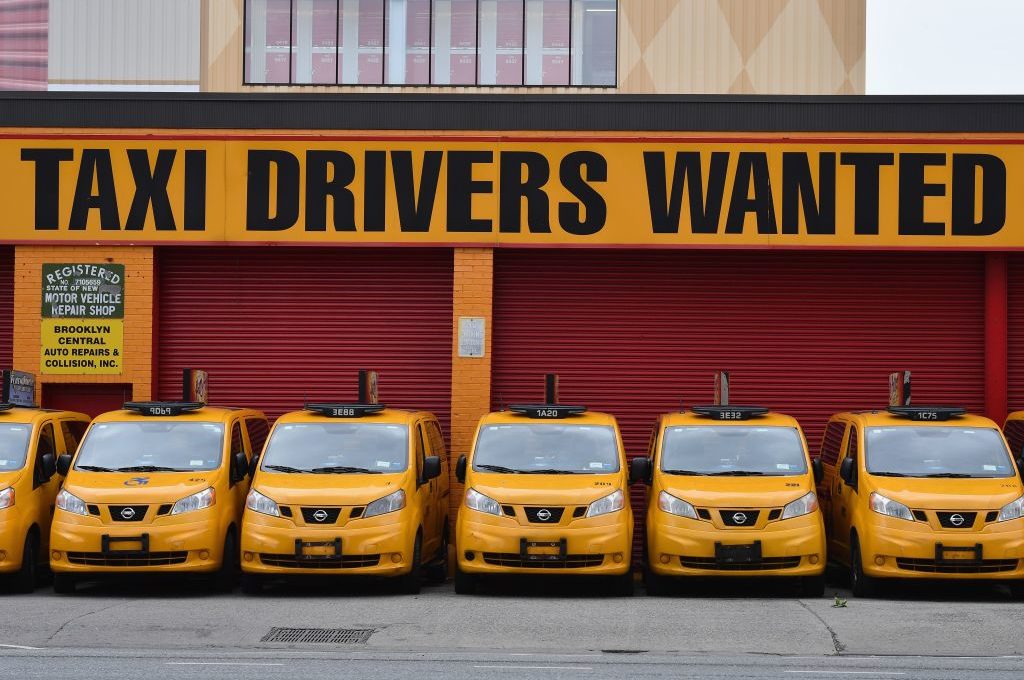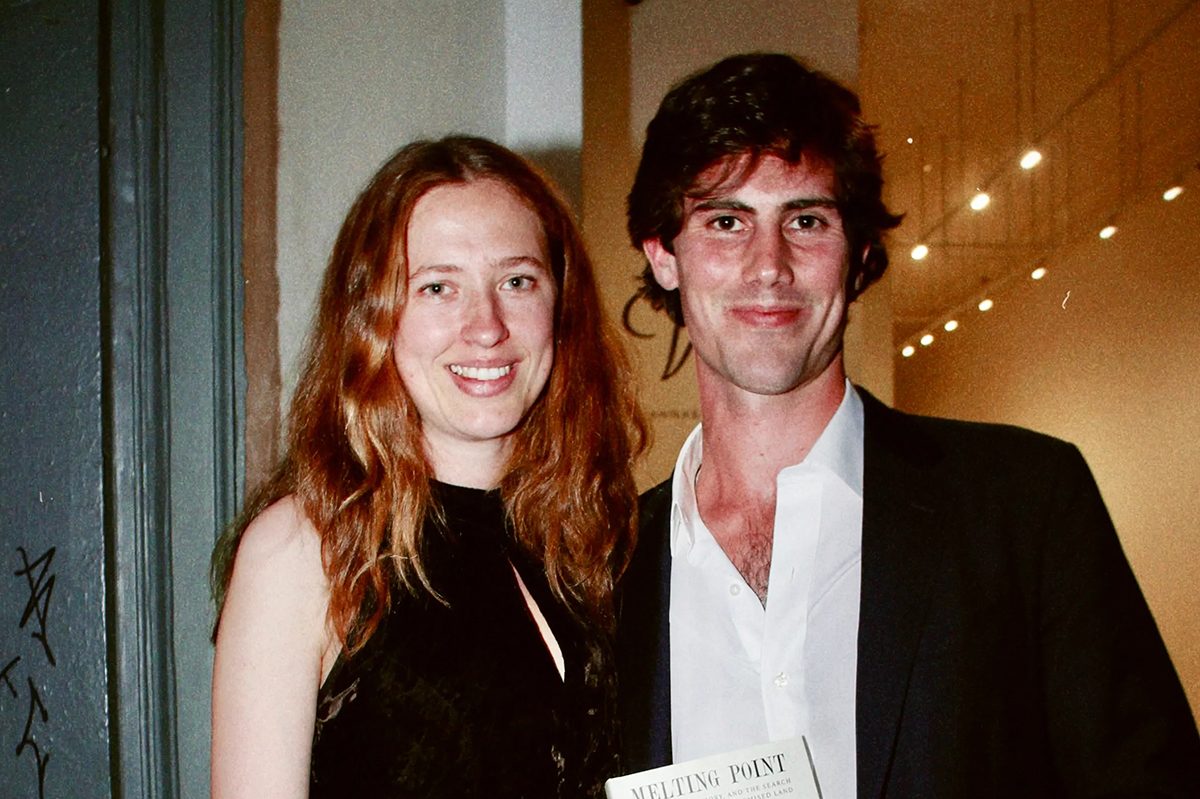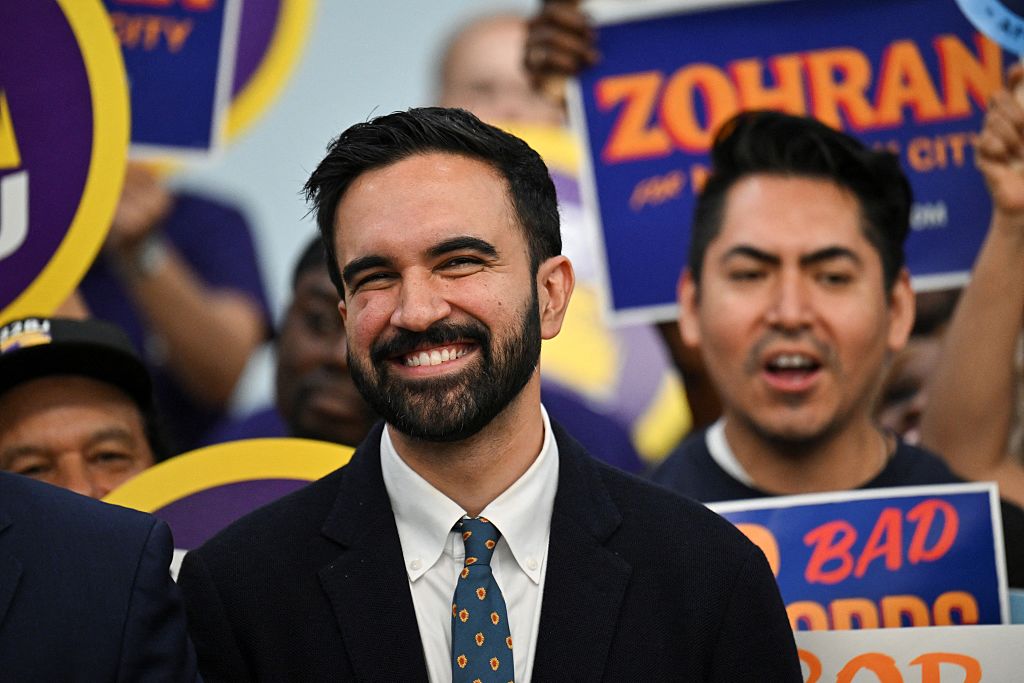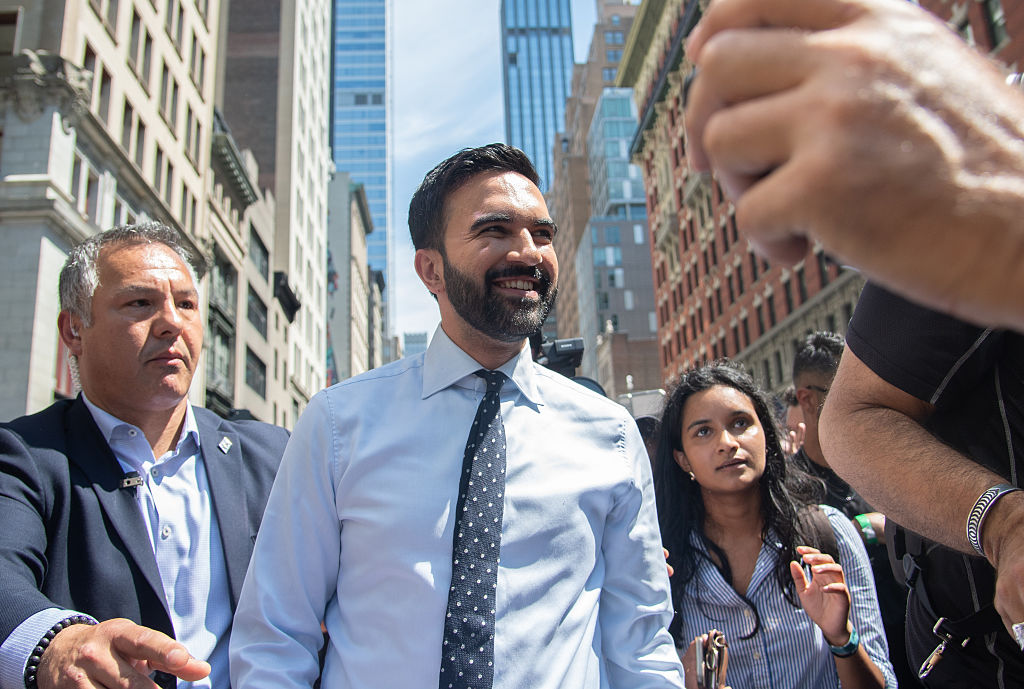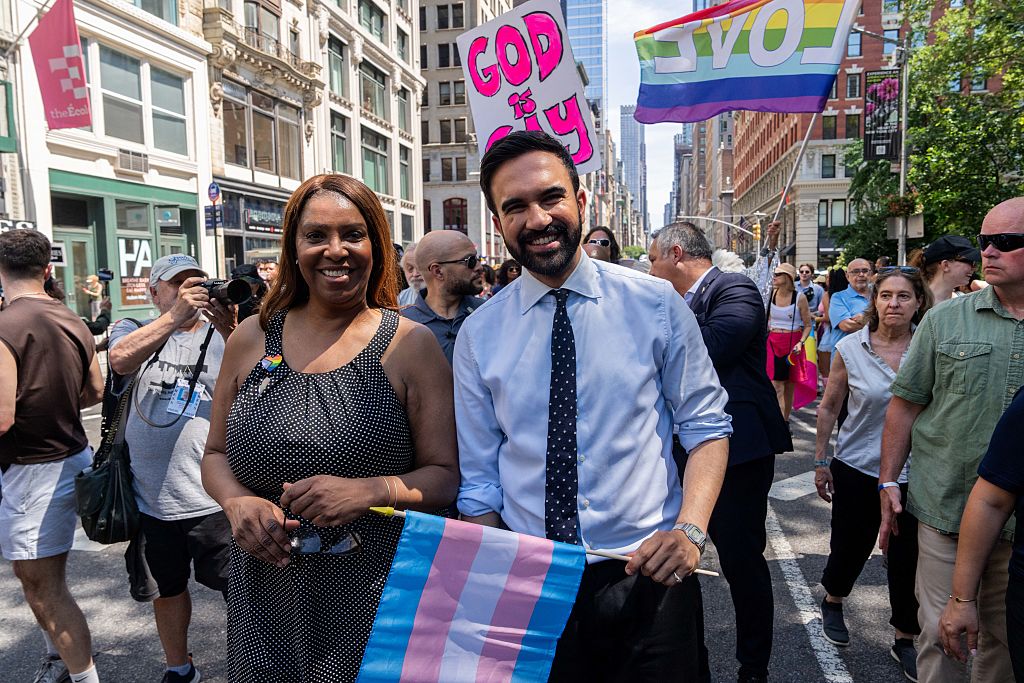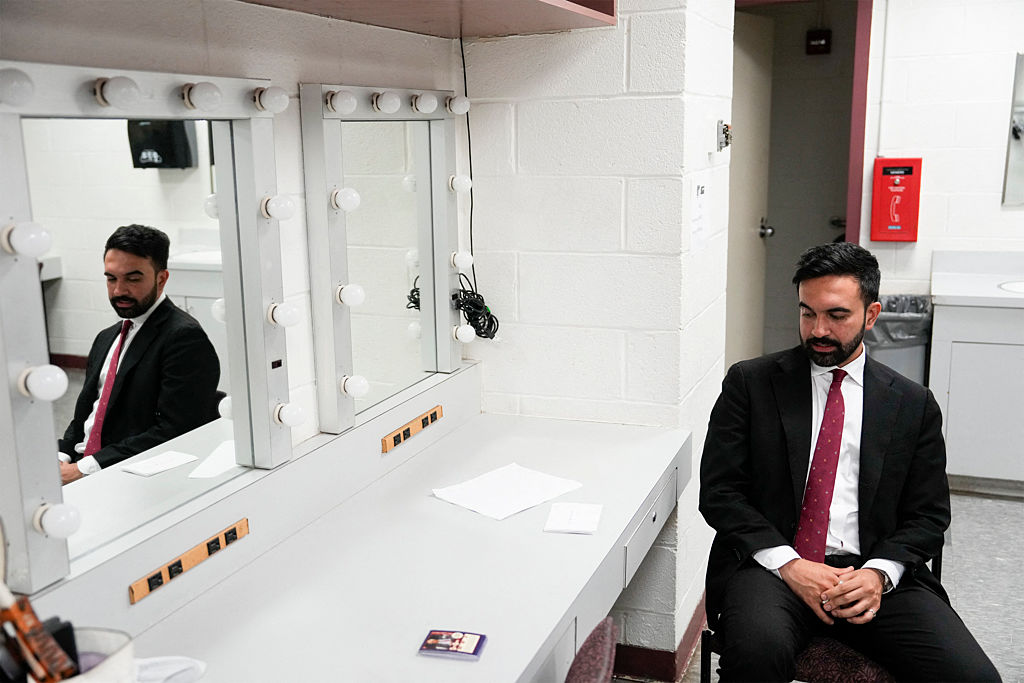Conservatives in a place like New York — squirming daily beneath the iron heel of a newly hawkish progressive minority — will tell you, like gay hanky-codes of yore, all the right-wing dog whistles to watch out for on the streets. The American flag is a big one. The once innocuous sight of a stranger sporting the stars and stripes on a t-shirt or hat, or outside a business, is now a good indicator you’re encountering someone who plans to vote Trump in November. Our nation’s flag is like garlic and holy water to the Black Lives Matter sentry. Unless it’s upside-down.
Mask defiance is another. In fact, I made a new friend that way, a couple weeks ago on the Long Island Rail Road, when I struck up a conversation with a fellow mask-less granny-killer across the aisle from me on the train. ‘When you sat down and I saw you weren’t wearing a mask, I thought, this guy’s alright,’ the man said to me.
Then there are those little barbs, flicked from six feet away at whoever is listening.
‘It’s like we’re living in a Banana Republic,’ a stranger at LaGuardia airport snarled at a group of people as we waited for taxis a couple weeks ago by way of new social-distancing guidelines for automobiles, apparently. A dispatcher now calls taxis one-by-one on the phone, rather than allowing them to line up for passengers as they’ve always done.
At LaGuardia the man kept on and the other travelers grew nervous. They were, after all, in the proximity of some loose-cannon who’d dare to question America’s governor — out loud! ‘None of this makes any sense, it’s such bullshit’, he said.
‘Total insanity,’ I muttered, which loosely translates to, you are my brother and I will take a fucking bullet for you! Trump 2020! in the coded public parlance of the New York conservative.
That afternoon, I wasn’t surprised when I got into a political discussion with my cab driver and it turned out we basically agreed on everything. He lived in Newark, and, unprompted, wanted to talk about a recent near-riot outside the police station there. ‘None of those people were from Newark, they’d all been bused in. You could tell,’ he said. ‘People in Newark like the police.’
When the conversation turned to Trump his reaction was radically even-keeled. ‘I don’t really like him, but he’s doing a good job and I get why people do like him,’ he said. ‘I don’t like how he tweets.’
Such a statement in most parts of New York City would be interpreted as so hate-filled. But that’s not the case in the back of a taxi cab. In any given week, I probably spend more time talking to cab drivers than I do to my own parents and over the years I’ve noticed a trend — they tend to be very conservative or, if liberal, quite anti-leftist.
Weeks after the 2016 election, en route to some tragically self-important corporate gala for a magazine I worked for at the time, my Muslim immigrant cab driver, perhaps sensing something in me, blurted into the silence, mid-ride, ‘I thank God that bitch Hillary didn’t win.’ Just a few weeks ago, in an Uber home from New Jersey, my driver was a young, attractive, tattooed Caribbean immigrant with dyed blond dreadlocks. He spewed comments so right-wing I thought they only existed on the internet before. His passion intensified when we got stuck in the middle of a BLM march in Brooklyn. By the end of the ride, he and I were such good friends we exchanged numbers and planned to grab a drink.
Although there’s no data on how cab or Uber drivers vote, I asked a friend who drives for Uber what he makes of it and he agreed, drivers tend to be conservative. ‘First off, they listen to talk radio all day long,’ he said, ‘which is mostly right-wing. Secondly, it tends to be a very respectful setting, where neither party can just fly off the handle about politics. That’s going to change the tenor of the discussion.’
Taxi or Uber work may lack the emotional reward members of the far left demand. The true believers — college professors and antifa or BLM rioters — are consumed by spreading the gospel. They’re Marxism’s holy rollers. A leftist probably won’t be very successful, or spiritually fulfilled, trying to convert the general public from behind the wheel of a cab. In fact, lasting dismay might set in after just a few trips. Such people need to feel mighty and in charge, which is why so many get their jollies by holding classrooms full of impressionable children hostage.
Cabbies also work for themselves and that comes with the dangerously right-wing attributes of self-reliance and discipline. They’re overwhelmingly men, although that has declined in the last 20 years from 87 percent to 82 percent, according to the Bureau of Labor Statistics. Then there’s all those legal immigrants, about 43 percent of taxi drivers. Many fled decaying or socialist nations; for them, America remains a shining city on the hill. Try asking a Nigerian immigrant driving your cab about Black Lives Matter and you’re sure to get an earful, as I have many times.
In my travels, the only possible exception to the conservative cabbie phenomenon may be Miami where the nation’s worst and most astoundingly incompetent Uber drivers operate. And I’m far from the only one to have noticed this. While visiting sunny South Florida it’s generally impossible to know what the man behind the wheel thinks politically because I have yet to meet a single one who speaks a word of English.
[special_offer]
Unlike our border-jumping friends in the Northeast, who do make an effort to assimilate, perhaps out of fear, a combative arrogance tends to infect the cabbies almost designed to make the interloping gringos feel as unwelcome as possible in the subtropical peninsula Venezuela, Colombia, and Cuba have colonized as their own. In Miami, the Western hemisphere’s northernmost South American city, text an Uber driver polite pick-up instructions and you’ll get a paragraph of third grade level Spanish in response or a simple, quite passive-aggressive ‘¡aviendo!’ to really drive the point — if not necessarily you — home. But the language barrier doesn’t disprove my theory, necessarily.
Something similar, at least it seems to me, happens with barbers — not to be confused with their more uppity cousins, the stylists. During lockdown it was always the barbers making headlines brazenly defying their state’s tyrannical lockdown orders — from Brooklyn to Texas to Michigan. Aside from sharing that more working-class sensibility with cab drivers, barbers also are often self-employed, spend their days with captive audiences of strangers from all walks of life, and skew heavily toward being legal immigrants. I’ve had three barbers in recent years from former Soviet countries. Like the Nigerians cabbies with BLM, don’t get a Soviet defector with clippers in his hand started on communism. You’ll leave bald.
For those countless people who get into cars and dare to tread on impolite subjects like politics perhaps cabbies merely notice patterns. That the liberals talk like cyborgs while conservatives tend to be more thoughtful. Or perhaps they notice how lefties tend to unwittingly treat service providers like the help, like the maids and nannies they grew up with, and they simply don’t find that lot to be very pleasant. Maybe that has something to do with it, too.



